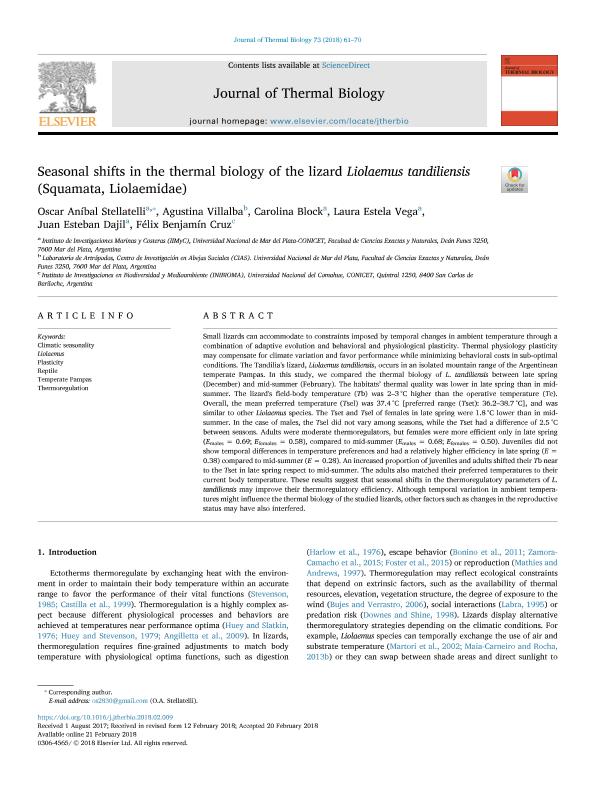Artículo
Seasonal shifts in the thermal biology of the lizard Liolaemus tandiliensis (Squamata, Liolaemidae)
Stellatelli, Oscar Aníbal ; Villalba, Agustina
; Villalba, Agustina ; Block, Carolina
; Block, Carolina ; Vega, Laura Estela; Dajil, Juan Esteban; Cruz, Felix Benjamin
; Vega, Laura Estela; Dajil, Juan Esteban; Cruz, Felix Benjamin
 ; Villalba, Agustina
; Villalba, Agustina ; Block, Carolina
; Block, Carolina ; Vega, Laura Estela; Dajil, Juan Esteban; Cruz, Felix Benjamin
; Vega, Laura Estela; Dajil, Juan Esteban; Cruz, Felix Benjamin
Fecha de publicación:
04/2018
Editorial:
Pergamon-Elsevier Science Ltd
Revista:
Journal of Thermal Biology
ISSN:
0306-4565
e-ISSN:
1879-0992
Idioma:
Inglés
Tipo de recurso:
Artículo publicado
Clasificación temática:
Resumen
Small lizards can accommodate to constraints imposed by temporal changes in ambient temperature through a combination of adaptive evolution and behavioral and physiological plasticity. Thermal physiology plasticity may compensate for climate variation and favor performance while minimizing behavioral costs in sub-optimal conditions. The Tandilia´s lizard, Liolaemus tandiliensis, occurs in an isolated mountain range of the Argentinean temperate Pampas. In this study, we compared the thermal biology of L. tandiliensis between late spring (December) and mid-summer (February). The habitats? thermal quality was lower in late spring than in midsummer. The lizard´s field-body temperature (Tb) was 2?3 °C higher than the operative temperature (Te). Overall, the mean preferred temperature (Tsel) was 37.4 °C [preferred range (Tset): 36.2?38.7 °C], and wassimilar to other Liolaemus species. The Tset and Tsel of females in late spring were 1.8 °C lower than in midsummer. In the case of males, the Tsel did not vary among seasons, while the Tset had a difference of 2.5 °C between seasons. Adults were moderate thermoregulators, but females were more efficient only in late spring (Emales = 0.69; Efemales = 0.58), compared to mid-summer (Emales = 0.68; Efemales = 0.50). Juveniles did not show temporal differences in temperature preferences and had a relatively higher efficiency in late spring (E = 0.38) compared to mid-summer (E=0.28). An increased proportion of juveniles and adults shifted their Tb near to the Tset in late spring respect to mid-summer. The adults also matched their preferred temperatures to their current body temperature. These results suggest that seasonal shifts in the thermoregulatory parameters of L. tandiliensis may improve their thermoregulatory efficiency. Although temporal variation in ambient temperatures might influence the thermal biology of the studied lizards, other factors such as changes in the reproductive status may have also interfered.
Archivos asociados
Licencia
Identificadores
Colecciones
Articulos(IIMYC)
Articulos de INSTITUTO DE INVESTIGACIONES MARINAS Y COSTERAS
Articulos de INSTITUTO DE INVESTIGACIONES MARINAS Y COSTERAS
Articulos(INIBIOMA)
Articulos de INST. DE INVEST.EN BIODIVERSIDAD Y MEDIOAMBIENTE
Articulos de INST. DE INVEST.EN BIODIVERSIDAD Y MEDIOAMBIENTE
Citación
Stellatelli, Oscar Aníbal; Villalba, Agustina; Block, Carolina; Vega, Laura Estela; Dajil, Juan Esteban; et al.; Seasonal shifts in the thermal biology of the lizard Liolaemus tandiliensis (Squamata, Liolaemidae); Pergamon-Elsevier Science Ltd; Journal of Thermal Biology; 73; 4-2018; 61-70
Compartir
Altmétricas



